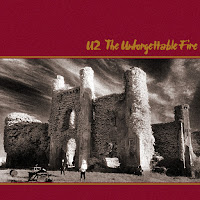 |
| U2—The Unforgettable Fire |
The Unforgettable Fire was recorded partially at Slane Castle in Slane, Co. Meath, Ireland, which allowed U2 to make use of the acoustics of its library and various other rooms, rather than Windmill Lane Studios where their first three albums were recorded. "A Sort of Homecoming" is nothing like U2 had recorded prior, benefiting from the roomier conditions, its impression best encapsulated by its lyric, "And your earth moves beneath/Your own dream landscape." The song's title is taken from a Paul Celan quote, so translated: "[Poems are] a kind of homecoming." The soaring "Pride (In the Name of Love)" directly references Martin Luther King, Jr., whose fate is compared with Christ's ("One man betrayed with a kiss") and casualties of war ("One man caught on a barbed wire fence ... One man washed on an empty beach"), who died, ironically, in the name of love. Bono sings of King, "They could not take your pride." The singer originally wrote the piece in reproach of U.S. president Ronald Reagan:
"Wire" is reportedly a commentary on drugs and musically exhibits the transition from the frenzied attack of War. The title of the shining "The Unforgettable Fire" refers to a Chicago Peace Museum exhibit of artwork by atomic bomb victims in Hiroshima, Japan. The lyric "Your eyes as black as coal" probably refers to Bono's wife Ali; on the lovely "Promenade" he sings of his and her house in Bray, Co. Wicklow, Ireland. The instrumental "4th of July" refers not to the U.S. holiday but its date of recording, on which Eno recorded guitarist The Edge and bassist Adam Clayton outside their knowledge. "Bad" foreshadows The Joshua Tree (1987) and is about heroin addiction—or rather, it should be noted that Bono actually sings about the theory of heroin addiction, because "Wire" and "Bad" exude the quality of being written by someone who only knows the terrors of drug addiction from observance of it. The EP Wide Awake in America (1985), which features an extended live cut of "Bad," takes its name partially from one of the song's lyrics."It was originally meant as the sort of pride that won't back down, that wants to build nuclear arsenals, but that wasn't working. I remembered a wise old man who said to me, 'Don't try and fight darkness with light, just make the lights shine brighter.' I was giving Reagan too much importance. Then I thought, Martin Luther King, there's a man. We build the positive rather than fighting with the finger. In the end this slain preacher from Atlanta, that dark note, was the way I found the balance. So I was able to keep that song in an ecstatic place." —Bono, undated NME interview1
"Indian Summer Sky" is a fairly plain yet ambiguously compelling song that evokes Talking Heads' "Listening Wind," which would be an arcane comparison if not for Eno's production credit on that band's landmark record Remain in Light. The much-maligned and admittedly sophomoric "Elvis Presley and America" has an interesting push to its rhythm and effects that make it worth hearing. "MLK" is a humbler tribute to King, continuing U2's psalmic tradition in the vein of "40" from War.
There is a sense with The Unforgettable Fire that Bono's writing suffered from naivety, but time has favored the album in the sense that he has shown naivety to be an essential quality of his person. The album was a decidedly transitional work for U2 as a band, and as such it's not perfect, but it is impassioned and inspired, and the sound is unique.
1 Courtesy of 33 Revolutions per Minute by Dorian Lynskey↩
1 Courtesy of 33 Revolutions per Minute by Dorian Lynskey↩

No comments:
Post a Comment